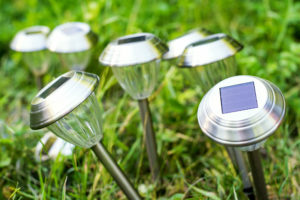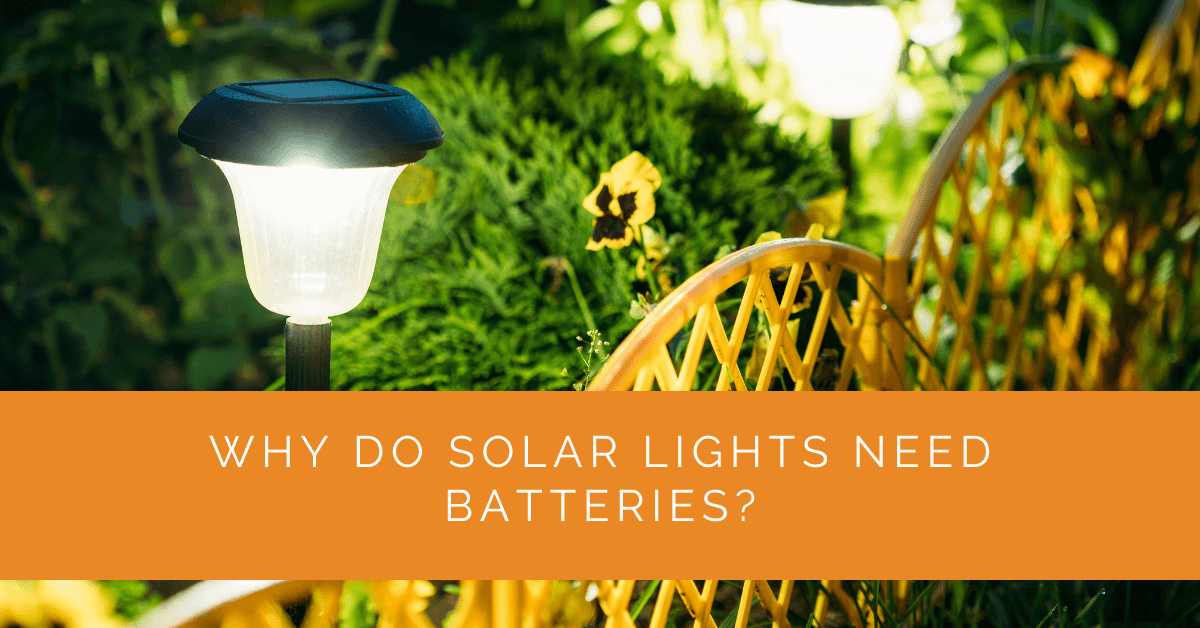Solar lights have become popular for outdoor lighting due to their eco-friendly nature and energy efficiency. But have you ever wondered why solar lights need batteries? In this article, we will delve into the inner workings of solar lights and explore batteries’ crucial role in their operation.
Contents
- 1 Key Takeaways
- 2 Understanding Solar Lights
- 3 Why Do Solar Lights Need Batteries?
- 4 Types of Batteries Used in Solar Lights
- 5 Importance of Battery Maintenance and Replacement
- 6 Expert Insights From Our Solar Panel Installers About Why Solar Lights Need Batteries
- 7 Our Expertise in Solar Lights
- 8 Conclusion
Key Takeaways
- Solar lights need batteries to store the electrical energy generated by the solar panel during the day, providing a continuous power supply for illumination during the night or in low-light conditions.
- Batteries overcome the variable availability of sunlight, ensuring reliable lighting even in cloudy or shaded areas.
- Regular battery maintenance, including monitoring performance, proper charging, and timely replacement, is essential for maximizing the lifespan and performance of solar lights.
Understanding Solar Lights
Solar lights are a remarkable technology that harnesses the power of the sun to provide illumination in outdoor spaces. Understanding how they work is essential for grasping batteries’ role in their operation.
How Solar Lights Work
Solar lights operate through a fascinating process involving converting sunlight into electrical energy. The key component responsible for this conversion is the solar panel. Made up of photovoltaic cells, the solar panel captures sunlight during the day and converts it into usable electricity. This energy is then stored in batteries when the sunlight diminishes, such as during the night or in shaded areas.
Components of Solar Lights
Solar lights comprise several essential components that harmonize harmoniously to provide efficient and sustainable lighting.
Solar Panel
The solar panel is the heart of a solar light system. Its purpose is to capture sunlight and convert it into electrical energy. The efficiency of the solar panel determines the amount of energy generated. Therefore, high-quality solar panels with advanced photovoltaic technology are crucial for optimal performance.
Battery
Batteries serve as the energy storage unit in solar lights. They store the electricity the solar panel generates during the day, ensuring a continuous power supply when sunlight is unavailable. Rechargeable batteries are commonly used in solar lights as they can be charged by the solar panel and provide reliable energy storage.
LED Bulb
LED bulbs are the light source of solar lights. LED technology is highly energy-efficient, consuming less power while producing bright, focused illumination. Compared to traditional incandescent bulbs, LEDs have a longer lifespan and are more durable, making them ideal for solar lights.
Light Sensor
The light sensor is a crucial component that detects changes in ambient light levels. When the light sensor senses a decrease in natural light, it triggers the activation of the solar light, utilizing the stored energy from the batteries to power the LED bulb. This automation ensures that the lights turn on and off automatically, providing convenience and energy efficiency.

Why Do Solar Lights Need Batteries?
Incorporating batteries in solar lights serve vital purposes, making them highly efficient and reliable lighting solutions.
Energy Storage and Illumination
Solar lights need batteries to store the electrical energy generated by the solar panel during the day. These batteries act as a reservoir, ensuring a steady power supply for illuminating the LED bulbs during nighttime or in low-light conditions. By storing excess energy, solar lights can continue to illuminate even when sunlight is insufficient.
Overcoming Variable Sunlight Availability
Solar lights with batteries are designed to overcome the intermittent availability of sunlight. While the solar panel captures energy during sunny periods, it cannot generate electricity when it’s cloudy or nighttime. Batteries play a crucial role in storing the excess energy generated during optimal conditions. This stored energy is then used to power the lights during reduced or no sunlight periods, ensuring a consistent and reliable illumination source.
Reliable Lighting in All Conditions
Solar lights equipped with batteries offer reliable lighting in various weather conditions. Even during extended periods of cloudy or overcast skies or in regions with shorter daylight hours, the stored energy in the batteries ensures that the lights continue to function. This reliability allows solar lights to provide consistent illumination, enhancing safety and aesthetics in outdoor areas.
Types of Batteries Used in Solar Lights
Several types of batteries can be used in solar lights, each with its characteristics and considerations. Let’s explore the two most common types:
NiMH (Nickel Metal Hydride) Batteries
NiMH batteries are widely used in solar lights due to their high energy density and longer lifespan. They can store more energy than other battery types, allowing solar lights to operate for extended periods. NiMH batteries are environmentally friendly, not containing toxic metals such as cadmium or mercury. They also exhibit a reduced memory effect, which means they can be recharged without experiencing a loss in capacity over time. NiMH batteries are a reliable and sustainable choice for solar lights, balancing performance and cost-effectiveness.
NiCd (Nickel Cadmium) Batteries
While NiCd batteries were commonly used in the past, their popularity has diminished due to environmental concerns. These batteries contain toxic cadmium, which can be harmful if not disposed of properly. Additionally, NiCd batteries are more susceptible to memory effects, which reduces their overall capacity over time. As a result, it is recommended to avoid using NiCd batteries in solar lights and instead opts for more environmentally friendly options.
Importance of Battery Maintenance and Replacement
Proper maintenance and periodic battery replacement are crucial for ensuring solar lights’ longevity and optimal performance. Neglecting battery care can result in diminished lighting output and reduced overall lifespan of the lights. Here’s why battery maintenance is important:
Battery Lifespan and Replacement
Solar light batteries have a limited lifespan, typically 1 to 3 years, depending on usage and quality. It is important to monitor the performance of the batteries and replace them when needed. Signs that indicate the batteries may need replacing include diminished lighting output, shorter illumination times, or the inability of the lights to stay on for the desired duration. Regularly check the battery performance and plan for a replacement to ensure consistent and efficient lighting.
Charging the Batteries
Proper charging of the batteries is essential for maintaining their efficiency and extending their lifespan. Solar lights are designed to charge the batteries using solar energy. To maximize the charging capability, it is crucial to keep the solar panels clean and free from any obstructions such as dirt or debris. Regularly inspect and clean the solar panels as needed to ensure optimal charging efficiency and maximum battery energy storage.
Replacing Batteries in Solar Lights
When replacing the batteries in your solar lights is necessary, it is important to follow the manufacturer’s instructions. Different solar lights may have specific battery requirements, and using the correct battery type and specifications is crucial for optimal performance. Purchasing replacement batteries from reputable sources and verifying compatibility is recommended to ensure seamless integration with your solar lights. Proper battery replacement will restore the lights’ performance and provide reliable illumination.
Expert Insights From Our Solar Panel Installers About Why Solar Lights Need Batteries
Batteries are essential for solar lights because they store the energy captured by the solar panels during the day, ensuring a consistent power supply at night or in low-light conditions.
Senior Solar Installation Engineer
Regular battery maintenance, including proper charging and timely replacement, is crucial for maintaining the efficiency and lifespan of your solar lights. Neglecting this can lead to reduced performance and shorter illumination times.
Lead Solar Technician
Choosing the right type of battery, such as NiMH over NiCd, can significantly impact the environmental footprint and performance of solar lights. NiMH batteries are more efficient and environmentally friendly.
Solar Energy Consultant
Our Expertise in Solar Lights
At Solar Panels Network USA, we’re here to provide you with valuable information and support regarding solar lighting. With our experience and understanding of the solar lighting industry, our team of experts is prepared to assist you in finding the right lighting solution for your needs. Whether you’re interested in improving your outdoor spaces, conserving energy, or adopting a more sustainable approach, we’re well-equipped to help. Please feel free to contact us with any questions or inquiries.
Conclusion
Solar lights are a remarkable and sustainable lighting solution for outdoor spaces. Understanding why solar lights need batteries helps us appreciate the synergy between the components and the importance of battery storage in ensuring reliable illumination. Whether using NiMH or other rechargeable battery types, proper maintenance and periodic battery replacement is crucial for maximizing the lifespan and performance of your solar lights. Embrace the power of solar energy and enjoy the eco-friendly benefits of solar lighting in your outdoor areas.
Remember to choose high-quality solar lights with reliable battery systems, monitor battery performance, and maintain the solar panels to optimize the efficiency and longevity of your solar lights. With their renewable energy source and innovative design, solar lights continue to brighten our surroundings while reducing our carbon footprint.
Harness the sun’s power, utilize solar lights, and illuminate your outdoor spaces in an environmentally conscious way.
About the Author
Solar Panels Network USA stands at the forefront of solar energy solutions, driven by a team of seasoned solar engineers and energy consultants. With over decades of experience in delivering high-quality solar installations and maintenance, we are committed to promoting sustainable energy through customer-centric, tailored solutions. Our articles reflect this commitment, crafted collaboratively by experts to provide accurate, up-to-date insights into solar technology, ensuring our readers are well-informed and empowered in their solar energy decisions.

